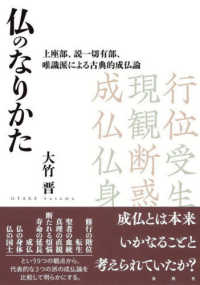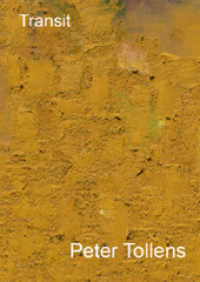- ホーム
- > 洋書
- > 英文書
- > Literary Criticism
Full Description
Chicano/a fiction is often understood as a literature of resistance to the dominant U.S. Anglo culture and society. But reducing this rich literary production to a single, binary opposition distorts it in fundamental ways. It conflates literature with life, potentially substituting a literature of protest for social activism that could provoke real changes in society. And it overlooks the complex range of responses to Anglo society that actually animates Chicano/a fiction.
In this paradigm-shifting book, Patrick L. Hamilton analyzes works by Rudolfo Anaya, Ana Castillo, Denise ChÁvez, Rolando Hinojosa, Arturo Islas, John Rechy, Alfredo VÉa, and Helena MarÍa Viramontes to expand our understandings of the cultural interactions within the United States that are communicated by Chicano/a fiction. He argues that the narrative ethics of "resistance" within the Chicano/a canon is actually complemented by ethics of "persistence" and "transformation" that imagine cultural differences within the United States as participatory and irreducible to simple oppositions. To demonstrate these alternative ethics, Hamilton adapts the methodology of cognitive mapping; that is, he treats the chosen fictional texts as mental maps that are constructed around and communicative of the narrative's ethics. As he reads these cognitive maps, which envision Chicano/a culture as being part of U.S. society rather than as "resistant" and separate, Hamilton asserts that the authors' conception of cultural difference speaks more usefully to current sociopolitical debates, such as those about gay marriage and immigration reform, than does the traditional "resistant" paradigm.
Contents
Acknowledgments
Introduction: Toward New Mappings of Contemporary Chicano/a Fiction
Chapter 1: Mapping Resistance in Rudolfo Anaya's Bless Me, Ultima and Rolando Hinojosa's "Sometimes It Just Happens That Way; That's All"
Chapter 2: Mapping Persistence in John Rechy's The Miraculous Day of Amalia GÓmez and Helena MarÍa Viramontes's "The Cariboo CafÉ"
Chapter 3: Cosmopolitan Communities in Alfredo VÉa's La Maravilla and Ana Castillo's So Far from God
Chapter 4: Changing Minds in Ana Castillo's Sapogonia and Arturo Islas's La Mollie and the King of Tears
Chapter 5: The Transformative Spaces of Alfredo VÉa's The Silver Cloud CafÉ and Gods Go Begging
Conclusion
Notes
Works Cited
Index
-

- 電子書籍
- べき分布とべき乗則
-

- 電子書籍
- 咲う アルスノトリア すんっ! 孤島の…






